Amala in Nigeria
Amala is a popular Nigerian dish that is particularly associated with the Yoruba people of southwestern Nigeria. It is a thick, dough-like food made from yam flour. Amala is usually served with various traditional Nigerian soups or stews.
To make Amala, yam flour is mixed with hot water to form a smooth dough. The yam flour used for Amala is derived from dried yam chips, which are peeled, sliced, and then dried before being ground into flour. The yam flour is then cooked by gradually adding it to boiling water while continuously stirring to prevent lumps from forming. The stirring process is important to achieve the desired consistency, which should be thick and smooth.
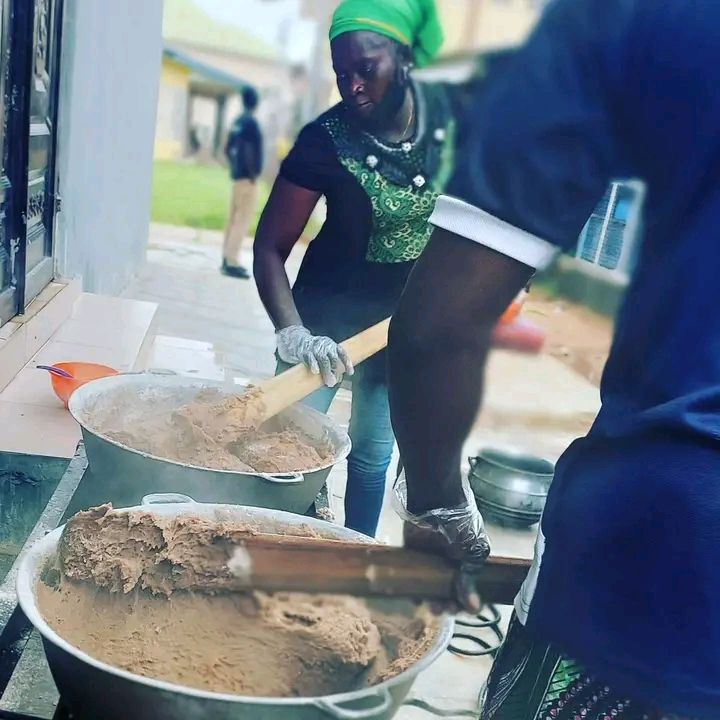
source
Once the Amala is cooked, it is usually served as a mound or ball on a plate or in a bowl. It is traditionally eaten with the right hand by breaking off small portions and using them to scoop up the accompanying soups or stews.
Amala is commonly paired with different Nigerian soups, such as Gbegiri (soup made from brown beans), Ewedu (jute leaf soup), Egusi (melon seed soup), Okra soup, and many others. These soups are often rich in vegetables, meats, or fish and provide a flavorful and nutritious complement to the Amala.
In Nigeria, Amala is a popular dish and can be found in local restaurants, food stalls, and homes. It is especially favored in the southwestern part of the country, including states like Lagos, Ogun, Oyo, and Osun. It is also enjoyed by people from other ethnic groups and has gained popularity across the country.
Amala is a delicious and satisfying meal that is deeply rooted in Nigerian culture and culinary traditions. It offers a unique and enjoyable dining experience, showcasing the diversity and richness of Nigerian cuisine.
States in Nigeria known for eating amala very well
Several states in Nigeria are known for their excellent preparation and consumption of Amala. These states include:
Lagos: Lagos, being the commercial hub of Nigeria, has a vibrant food scene and is known for its diverse culinary offerings. Amala is widely enjoyed in Lagos, and you can find numerous restaurants and food joints that specialize in serving delicious Amala and various accompanying soups.
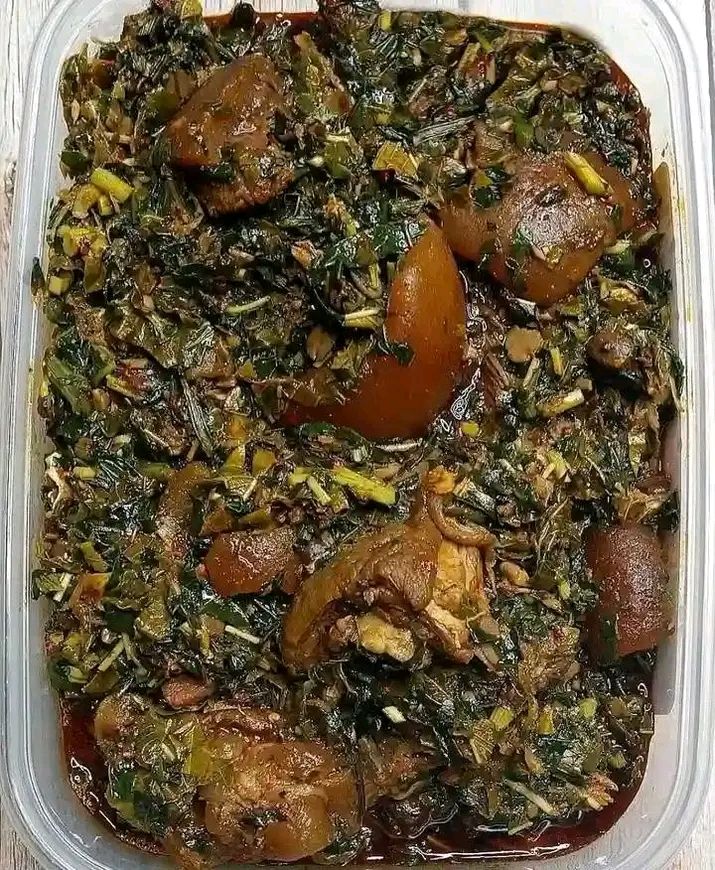
sourceOyo: Oyo State, located in southwestern Nigeria, is known as the birthplace of Amala. The city of Ibadan, the capital of Oyo State, is particularly renowned for its Amala joints. The locals take pride in preparing Amala with authentic flavors and serve it with different traditional soups.
Osun: Osun State, also located in southwestern Nigeria, is another state famous for its Amala culture. Cities like Osogbo and Ilesa are known for their tasty and well-prepared Amala dishes, attracting both locals and visitors.
Ogun: Ogun State, neighboring Lagos State, is another state where Amala is highly appreciated. Cities such as Abeokuta and Sagamu have popular Amala spots where you can savor the dish alongside a variety of delicious Nigerian soups.
Ekiti: Ekiti State, also located in southwestern Nigeria, is known for its love for Amala. In cities like Ado-Ekiti and Ikere-Ekiti, you can find eateries and local joints offering well-prepared Amala dishes with traditional accompaniments.
It's important to note that while these states are renowned for their Amala culture, you can still find delicious Amala in various parts of Nigeria, as the dish has gained popularity nationwide. Local variations in preparation and accompanying soups may exist, adding to the diversity and richness of Amala across the country.
The joy in eating amala and gbegiri soup
The joy of eating Amala and Gbegiri soup comes from a combination of factors, including the flavors, textures, cultural significance, and the communal experience it often entails. Here are some reasons why people find joy in eating this traditional Nigerian dish:
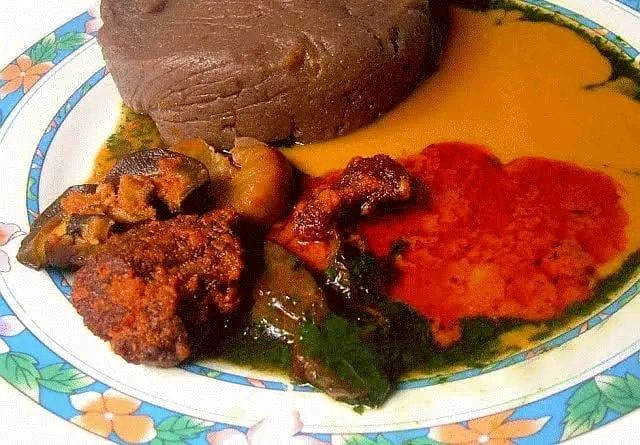
source
Rich and distinct flavors: Amala and Gbegiri soup have unique and rich flavors that come from the combination of ingredients and spices used in their preparation. The savory taste of Gbegiri soup, made from brown beans, palm oil, and assorted meats or fish, complements the subtle earthy flavor of the Amala dough. The blend of flavors provides a satisfying and comforting eating experience.
Cultural significance: Amala and Gbegiri soup are deeply rooted in Nigerian culture, particularly among the Yoruba people. The dish is often associated with celebrations, gatherings, and special occasions. Sharing a plate of Amala and Gbegiri soup with family and friends can evoke a sense of cultural identity and pride, connecting people to their heritage and traditions.
Comfort food: Amala and Gbegiri soup are considered comfort foods for many Nigerians. The warmth, thickness, and hearty nature of the dish make it a comforting and fulfilling meal, especially during cooler weather or when seeking a satisfying and nourishing option.
Communal dining experience: In Nigerian culture, eating Amala and Gbegiri soup often involves communal dining, where people gather around a large plate or bowl of the dish. This communal experience fosters a sense of togetherness, sharing, and bonding. It creates an atmosphere of joy, laughter, and conversation as everyone enjoys the meal together.
Versatility: Amala and Gbegiri soup can be enjoyed with various side dishes, such as Ewedu (jute leaf soup), vegetable soup, or stewed meats. This versatility allows for customization based on personal preferences and provides an opportunity to explore different flavor combinations, enhancing the overall enjoyment of the meal.
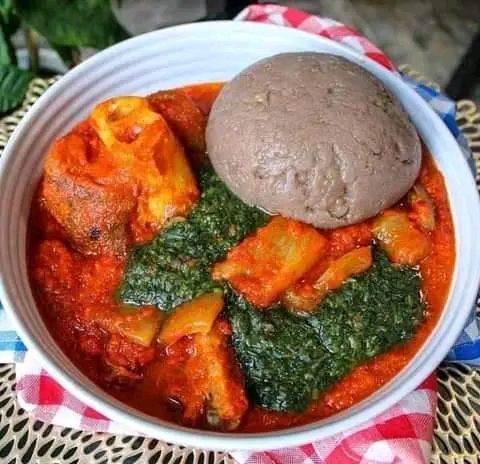
source
The joy in eating Amala and Gbegiri soup lies in the cultural significance, unique flavors, and communal experience that it offers. It is a dish that brings people together, celebrates Nigerian culinary traditions, and provides a delicious and satisfying dining experience.
Amala and gbegiri soup
Amala and Gbegiri soup is a traditional Nigerian dish that is popular among the Yoruba people, particularly in southwestern Nigeria. It is a combination of two main components: Amala, a thick dough made from yam flour, and Gbegiri soup, a savory soup made from brown beans.
To prepare Amala and Gbegiri soup, here's a general recipe:
Ingredients for Amala:
- Yam flour
- Water
Ingredients for Gbegiri Soup:
- Brown beans
- Palm oil
- Assorted meat or fish (optional)
- Onion
- Pepper (fresh or dried)
- Seasoning cubes
- Salt
- Locust beans (Iru)
- Vegetables (optional)
Instructions:
Amala:
- In a pot, bring water to a boil.
- Gradually add yam flour to the boiling water, stirring continuously to avoid lumps.
- Keep stirring until the mixture thickens and forms a smooth dough-like consistency.
- Remove from heat and set aside.
Gbegiri Soup:
- Rinse the brown beans thoroughly and place in a pot.
- Add water and cook the beans until they become soft and easily mashed.
- Once cooked, transfer the beans into a blender or food processor and blend until smooth. You can also use a mortar and pestle for this step.
- In a separate pot, heat palm oil and add diced onions. Sauté until the onions are translucent.
- Add the blended beans to the pot and stir well.
- Add the assorted meat or fish (if using), pepper, seasoning cubes, salt, and locust beans (Iru) to the pot. Stir to combine.
- Allow the soup to simmer for about 10-15 minutes, allowing the flavors to meld together.
- If desired, add vegetables such as spinach or ugwu leaves and cook for an additional 2-3 minutes.
- Taste and adjust the seasoning as needed.
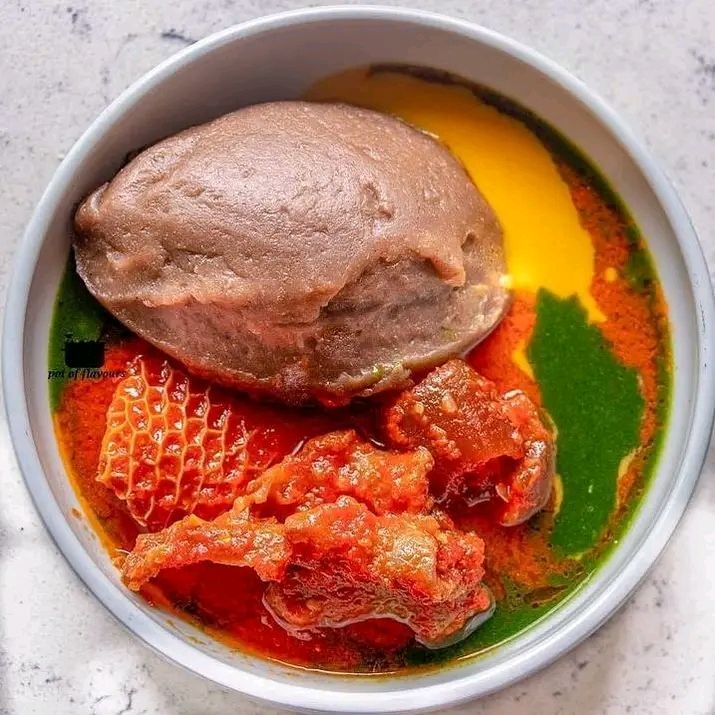
[source]https://www.facebook.com/100066799854531/posts/pfbid0pB7nQp7A6fYC9fYvBouJSeBPX9GQ2zmSdxst9Gy8bJ2nG9nS93EEgyisjwFbAsQil/?app=fbl)
To serve, place a portion of the Amala in a plate or bowl, and pour the Gbegiri soup over it. Amala and Gbegiri soup is often enjoyed with various Nigerian side dishes such as ewedu (jute leaf soup), vegetable soup, or stewed meats.
Note: This recipe is a basic guideline, and variations may exist depending on personal preferences and regional differences.
Which states prepares the best gbegiri soup
Gbegiri soup is a popular Nigerian soup, particularly among the Yoruba people. While there are variations in taste and preparation methods, several states in Nigeria are known for preparing delicious Gbegiri soup. Here are a few states renowned for their excellent Gbegiri soup:
Oyo: Oyo State, located in southwestern Nigeria, is considered the home of Gbegiri soup. The city of Ibadan, in particular, is known for its mastery in preparing authentic Gbegiri soup. Many local restaurants and eateries in Ibadan specialize in serving this soup with Amala or other swallow dishes.
Lagos: As Nigeria's economic and cultural hub, Lagos has a vibrant food scene with various regional cuisines represented. Lagosians have developed their own unique spin on Gbegiri soup, with a balance of flavors that appeals to a diverse population. You can find excellent Gbegiri soup in numerous restaurants and food joints across the city.
Osun: Osun State, also in southwestern Nigeria, is another state known for its tasty Gbegiri soup. Cities like Osogbo and Ilesa are famous for their flavorful and well-prepared Gbegiri dishes, often served with Amala or other local staples.
Ogun: Ogun State, neighboring Lagos, is another state where Gbegiri soup is prepared with expertise. Cities such as Abeokuta and Sagamu are known for their delicious Gbegiri soup, which can be enjoyed in local eateries and restaurants.
Ekiti: Ekiti State, located in southwestern Nigeria, is also renowned for its Gbegiri soup. The city of Ado-Ekiti, in particular, is known for preparing Gbegiri soup with a distinct flavor profile, often accompanied by Amala or other swallow dishes.
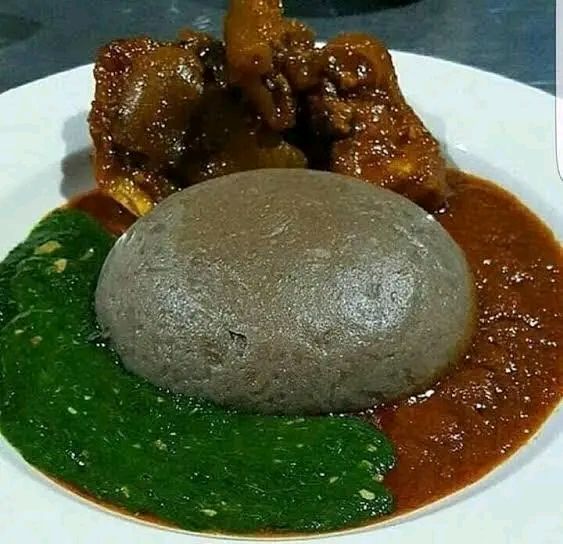
It's worth mentioning that the preparation and flavors of Gbegiri soup can vary from one household or restaurant to another, even within the same state. Different personal preferences, cooking techniques, and ingredient variations may contribute to the uniqueness of Gbegiri soup across Nigeria.
How about Amala, which states makes it well?
Amala is a popular Nigerian dish made from yam flour, and it is enjoyed across the country. While it is widely prepared and appreciated throughout Nigeria, there are a few states known for their exceptional Amala. Here are some states renowned for making delicious Amala:
Oyo: Oyo State, particularly the city of Ibadan, is considered the epicenter of Amala. It is widely acknowledged as the birthplace of Amala in Nigeria. Ibadan boasts numerous Amala joints and restaurants where you can savor the dish with various traditional soups.
Lagos: As Nigeria's largest city and a melting pot of diverse cultures, Lagos has a thriving Amala culture. The city offers a wide range of options for enjoying Amala, with many restaurants and local spots specializing in the dish. Lagosians take pride in their Amala, ensuring its availability and quality throughout the city.
Osun: Osun State, known for its rich Yoruba heritage, is another state where Amala is prepared exceptionally well. Cities like Osogbo and Ilesa are famous for their Amala joints and restaurants that serve delicious variations of the dish.
Ogun: Ogun State, neighboring Lagos, is renowned for its flavorful Amala. Cities like Abeokuta and Sagamu have a strong Amala culture, and you can find numerous local eateries and restaurants that excel in preparing this beloved dish.
Ekiti: Ekiti State, located in southwestern Nigeria, is also known for its love for Amala. In cities like Ado-Ekiti and Ikere-Ekiti, you can find eateries and local joints that serve well-prepared and delicious Amala.
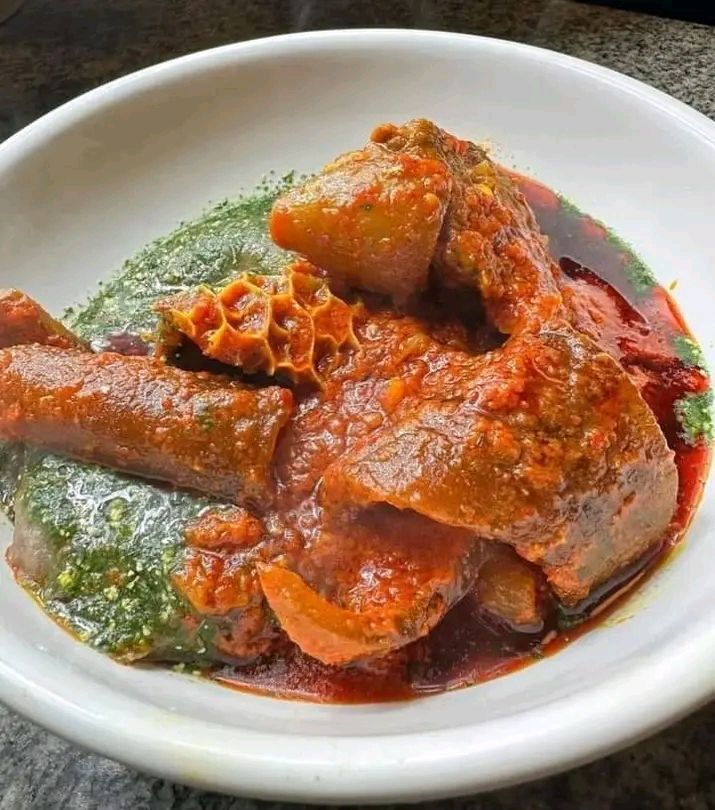
It's important to note that while these states are renowned for their Amala, you can still find tasty variations of the dish across Nigeria. Each region may have its own unique twist on the preparation, adding to the diversity and enjoyment of Amala nationwide.
Amala as a meal in a Nigerian menu
Amala is a staple dish in Nigerian cuisine and often features prominently on menus. In a typical Nigerian menu, Amala can be enjoyed as a standalone meal or paired with various soups and stews. Here's how Amala may be presented on a Nigerian menu:
Amala and Gbegiri Soup: This combination is a classic pairing in Nigerian cuisine. Gbegiri is a savory soup made from brown beans and typically served with Amala. The menu may list "Amala and Gbegiri Soup" as a separate item, indicating that it includes a serving of Amala with a generous portion of Gbegiri soup.
Amala and Ewedu Soup: Ewedu, a soup made from jute leaves, is another popular accompaniment to Amala. The menu may feature "Amala and Ewedu Soup" as a standalone option, offering a serving of Amala with a side of Ewedu soup.
Amala and Egusi Soup: Egusi soup, made from ground melon seeds, is a flavorful and widely enjoyed Nigerian soup. A menu may include "Amala and Egusi Soup" as a distinct item, comprising a serving of Amala with a serving of Egusi soup.
Amala and Vegetable Soup: Vegetable soup is a versatile and nutritious option that complements Amala well. The menu might list "Amala and Vegetable Soup," featuring a serving of Amala with a side of vegetable soup filled with assorted vegetables and sometimes meat or fish.
Amala and Stewed Meats/Fish: Amala can also be paired with deliciously seasoned and stewed meats or fish. The menu might offer "Amala with Stewed Meats" or "Amala with Stewed Fish," presenting a serving of Amala accompanied by a portion of tender and flavorful meat or fish in a rich stew.
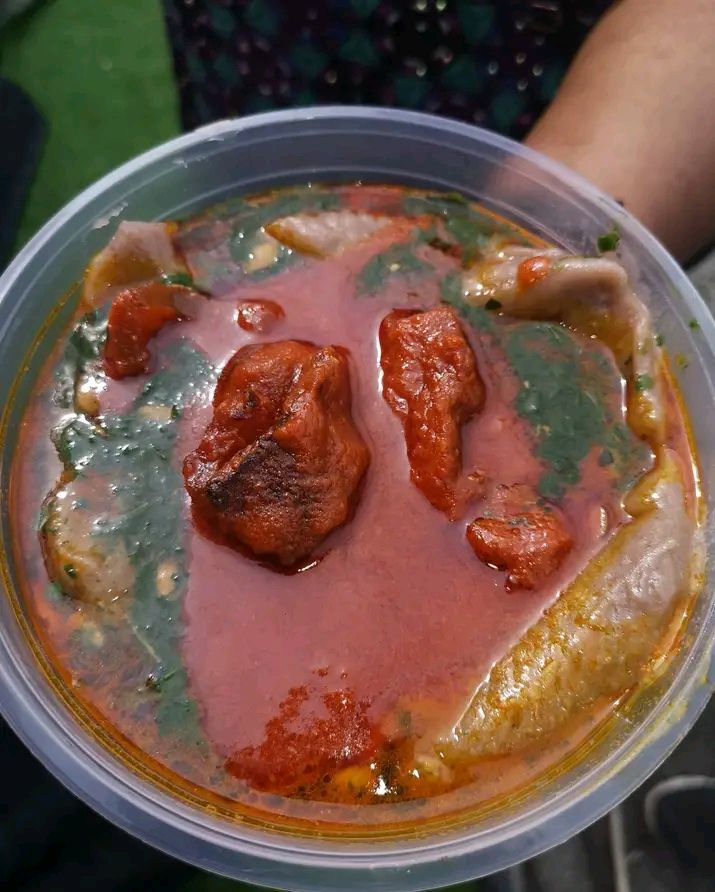
These are just a few examples of how Amala can be presented on a Nigerian menu. The actual menu offerings may vary depending on the restaurant or establishment, and there may be additional variations and options available based on regional preferences and local specialties.
Are there any types of amala?
Yes, there are different types of Amala in Nigerian cuisine. The variations of Amala usually depend on the type of yam or other starchy tubers used to make the flour. Here are a few types of Amala:
Amala Isu (Yam Flour Amala): This is the most common type of Amala, made from yam flour. It is widely available and widely consumed across Nigeria. Yam flour is mixed with hot water to form a thick dough, which is then cooked to create Amala Isu.
Amala Lafun: Amala Lafun is made from cassava flour instead of yam flour. It has a lighter texture compared to Amala Isu and is popular in some regions of Nigeria, particularly among the Edo and Delta ethnic groups.
Amala Ogede: Amala Ogede is made from plantain flour. Ripe plantains are dried and ground into flour, which is then used to make the Amala dough. It has a slightly sweeter flavor and is enjoyed by people who prefer a plantain-based option.
Amala Elubo: Amala Elubo is made from unripe plantain flour. Unripe plantains are peeled, dried, and ground into flour, which is then used to make the Amala dough. Amala Elubo has a distinct taste and is popular in some parts of southwestern Nigeria.

It's important to note that while these are some of the common types of Amala, regional variations and preferences exist across Nigeria. Each type of Amala has its own unique taste, texture, and cultural significance, and they are often paired with different soups and stews based on personal preferences and regional traditions.
Amala is a popular Nigerian dish made from yam flour or other starchy tuber flours. It is enjoyed across Nigeria and holds cultural significance, particularly among the Yoruba people. Amala is often paired with various traditional Nigerian soups and stews, such as Gbegiri, Ewedu, Egusi, and vegetable soup.
States such as Oyo, Lagos, Osun, Ogun, and Ekiti are known for their expertise in preparing Amala and showcasing their unique flavors and culinary traditions. These states have a vibrant Amala culture, with numerous restaurants, local joints, and eateries offering well-prepared and delicious Amala dishes.
The joy of eating Amala and Gbegiri soup, or any other combination of Amala and Nigerian soups, comes from the rich flavors, cultural significance, comfort it provides, and the communal dining experience it often entails. Amala is not only a satisfying and nourishing meal but also a representation of Nigerian culinary heritage and a source of joy and connection within communities.
In conclusion
Whether you enjoy Amala as a standalone meal or paired with soups and stews, it offers a delightful and authentic taste of Nigerian cuisine, showcasing the diversity and richness of flavors in the country's culinary traditions.